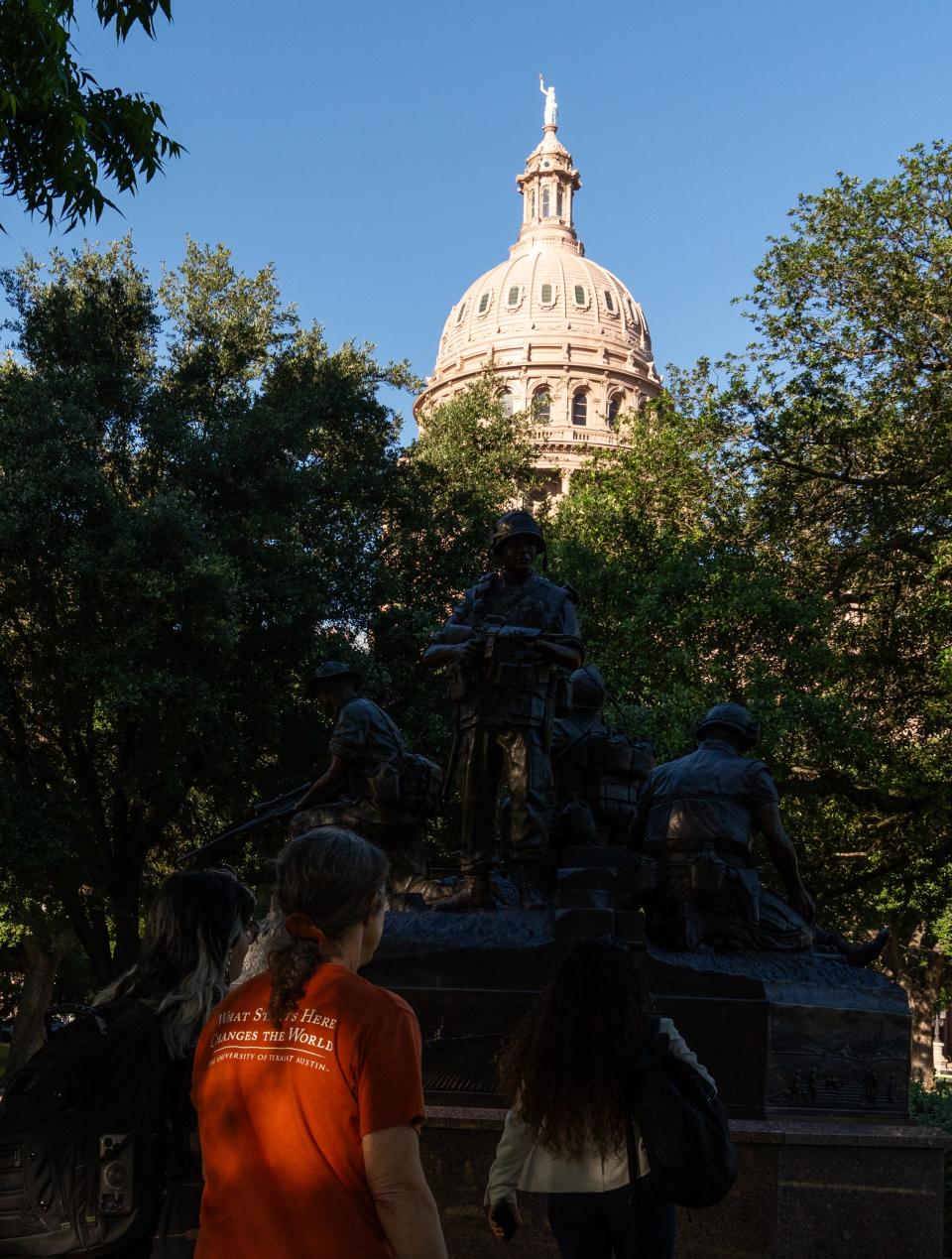Abbott, UT System, UH system sued over executive order to combat antisemitism at colleges
- Oops!Something went wrong.Please try again later.
Students for Justice in Palestine chapters at the University of Houston and the University of Texas at Dallas as well as the Democratic Socialists of America, which runs youth chapters at several Texas universities, are suing Gov. Greg Abbott over his executive order calling for universities to change free speech policies to better prevent antisemitism on college campuses, including by enforcing the policies against Students for Justice in Palestine and the Palestine Solidarity Committee, its chapter at UT-Austin.
The plaintiffs, represented by Council on Islamic Relations, filed a suit Thursday asking a U.S. District Court to issue an injunction barring the executive order, saying it targets and chills speech against Israel by specifically naming Students for Justice in Palestine and the Palestine Solidarity Committee and by calling for colleges to recognize a broad definition of antisemitism. CAIR alleges that the order's implementation in some cases has censored students' speech in violation of the First Amendment.
Who else is named in the lawsuit and why?
In addition to Abbott, the University of Texas System Board of Regents, University of Houston and the UH System Board of Regents are also named as defendants, as well as Rene Khator, who serves as chancellor of the UH System and president of its flagship school.
University systems and institutions are responsible for carrying out the executive order at their respective institutions, and they are responsible for the legality of their policies.
The president of UT-San Antonio, Taylor Eighmy, is named as a defendant for the second count in the lawsuit, which alleges that UT-San Antonio adopted a "phrase-specific" rule barring Young Democratic Socialists of America members from saying "From the River to the Sea, Palestine will be free."

Abbott's executive order specifically lists this an example of "antisemitic phrases." But the lawsuit says the rule is an illegal content-based free speech limitation, and the suit says "its literal and figurative meaning reflect an aspiration for peace and dignity for all people—Palestinians, Israelis, Arabs, Muslims, Jews, Christians, and everyone else."
A UT-San Antonio spokesperson said the university does not comment on pending litigation and did not answer a question asking if the rule was in place as stated in the lawsuit.
The UH System Board of Regents on Wednesday added the state's definition of antisemitism to its policies, the flagship university confirmed in a statement, saying the university has met with Students for Justice in Palestine and "reiterated our commitment to freedom of expression." The University of Houston also asserted that the freedom of expression policy is equally applied without regard to viewpoint and that the system enforces both its freedom of expression policy and anti-discrimination policy.

"The University recognizes and supports the constitutional rights of free speech and peaceful assembly," the statement said. "We encourage all who engage in expressive activity to do so safely and in a manner that respects the rights of others with differing opinions."
The definition of antisemitism that Abbott ordered universities to adopt is "a certain perception of Jews that may be expressed as hatred toward Jews," including "rhetorical and physical acts of antisemitism directed toward Jewish or non-Jewish individuals or their property or toward Jewish community institutions and religious facilities."
CAIR's complaint, filed in U.S. District Court for the Western District of Texas, asks for relief under the First and 14th amendments, and calls for Abbott's executive order and the UT-San Antonio rule about the slogan to be withdrawn. The suit also requests for the UT and UH systems to not include the International Holocaust Remembrance Alliance's definition of antisemitism as specified in Abbott's order "or otherwise target individuals because of their political speech about Israel."
"We are hopeful that a court will see this for what it is, a clear as day abandonment of the First amendment," Gadeir Abbas, an attorney for the plaintiff with CAIR, told the American-Statesman on Thursday.
In a statement Thursday, Andrew Mahaleris, Abbott's press secretary, said antisemitism has been rising, and that the governor "condemns heinous acts of violence and inhumanity against Israel and its people by ruthless terrorists."
"Antisemitism is never acceptable in Texas, and we will do everything we can to fight it," Mahaleris said. "Texas will always stand with Israel and our Jewish neighbors here at home and across the world.”
What was the governor's executive order?
Abbott issued his executive order March 27 to address antisemitism at Texas universities. The Anti-Defamation League reports that acts of antisemitic have risen dramatically since Oct. 7, when Hamas, the militant Palestinian group that controlled the Gaza strip, launched a surprise attack on Israel that killed 1,200 people.
In response, Israel began bombarding Gaza, reportedly killing more than 34,000 people since the war's start. Islamophobic incidents have also risen dramatically since Oct. 7, according to CAIR.
Abbott's executive order did not mention rising incidents of Islamophobia but did mention the state's continued support for Israel and Jewish Texans.
"While many Texas universities have acted quickly to condemn antisemitism and foster appropriate discourse on the terrorist attacks against Israel and the ensuing Israel-Hamas war, some radical organizations have engaged in unacceptable actions on university campuses," the order said.
The order charges all public institutions of higher education in Texas to revise their free speech policies to address antisemitism, instating punishments including up to expulsion, enforcing the policies against groups "such as the Palestine Solidarity Committee and Students for Justice in Palestine" and including the definition of antisemitism that is in the Texas Government Code.

The lawsuit draws a contrast between a 2019 law Abbott signed making college campuses public forums for free speech, and his suppression of anti-Israel speech, which he deems antisemitic. It also draws attention to Abbott's deployment of Texas Department of Public Safety troopers at UT-Austin during pro-Palestinian protests in the past few weeks, which they said further reflects the suppression of anti-Israel speech.
"The events of the last few weeks increased the urgency to challenges to these really extreme efforts to make it impossible to do the normal and typical advocacy things that students do," Abbas said. "Only when it comes to Palestine and Israel."
What constitutes antisemitic speech?
The definition of antisemitism mentioned in Abbott's order is in the Texas Government Code and is pulled from the International Holocaust Remembrance Alliance, which describes the definition on their website as a "non-legally binding working definition."
"Manifestations might include the targeting of the state of Israel, conceived as a Jewish collectivity. However, criticism of Israel similar to that leveled against any other country cannot be regarded as antisemitic," the Holocaust remembrance alliance's website states. "Antisemitism frequently charges Jews with conspiring to harm humanity, and it is often used to blame Jews for 'why things go wrong.'"
The site's FAQ states that "claiming that the existence of a State of Israel is a racist endeavor" would qualify as antisemitism. "Israel is a racist state" has been chanted during recent pro-Palestinian protests at UT, as has "From the River to the Sea."
The lawsuit states that the definition "once adopted, would transform normal and typical criticism of a foreign country into antisemitism when the foreign country criticized is Israel."
Mahaleris did not answer specific questions about the lawsuit or its criticism that Muslim students don't have the same free speech or safety protections as Jewish students. UT System also declined to comment.
This article originally appeared on Austin American-Statesman: Lawsuit accuses Abbott, Texas systems of censoring anti-Israel speech

